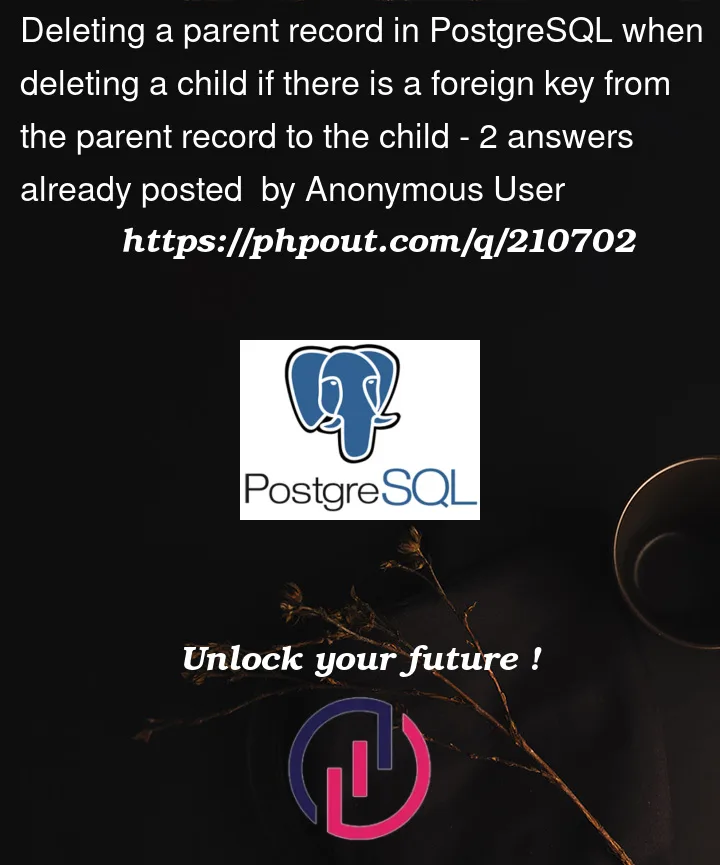Friends, hello everyone. We faced a problem at work that we couldn’t solve. It became clear that simple
there is no solution, so we decided to ask the advice of more experienced people on the forum.
-
We have a PostgreSQL database and we work with it using the SqlAlchemy python framework using its ORM
-
We have an entity that can be represented as:
{
uuid: UUID
data: {
property_1: {
value: str
}
property_2: {
value: str
}
property_3: {
value: str
}
}
}
or as multiple nested entities
Main
{
uuid: UUID
data: Data
}
Data
{
property_1: Property
property_2: Property
property_3: Property
}
Property
{
value: str
}
- We have three tables that allow us to store such an entity
main_table
{
id: int
uuid: UUID
}
data_table
{
id: int
main_id: int = ForeignKey (main_table.id)
property_1_id: ForeignKey (property_table.id)
property_2_id: ForeignKey (property_table.id)
property_3_id: ForeignKey (property_table.id)
}
property_table
{
id: int
value: str
}
It can be seen that the second table contains several columns of the same type (Property)
It turns out such a relationship by foreign keys between tables:
main_table <--- data_table ---> property_table
If you poison an entity into the database, then it will correctly decompose into tables, while reading everything is also correctly assembled from tables into one object.
BUT there is a problem with the removal!
For ForeignKey in data_table ON DELETE CASCADE is set, so when we delete a record in main_table, the record in data_table is automatically deleted, and the records in property_table remain garbage, because they do not refer to the record in data_table, but vice versa, so there is a cascade deletion does not work.
Question. On the face of it, this is a fairly typical task, but we have not yet encountered this. I ask to prompt an approach or approaches in the decision.
We need to be able to delete the entire entity, that is, records in all tables associated with the entity. In other words, when deleting an entry in main_table, all entries associated with it from the data and property tables are deleted
Thank you in advance!
I tried to use ON DELETE CASCADE but figured out that it can’t work with such relation direction. It works only for deleting the entry that has a foreign key to another entry when deleting this another one




2
Answers
To me it looks like a conceptual / design issue.
Why are you storing values in separate table if they are not unique?
If the
property_table.valueattribute does not make sense without corresponding record indata_table, it should not be stored in a separate table.Each object in your model should have a natural (aka "business") key, not only an artificial key.
Maybe the model is "over-normalized"? Why not keep values in data_table?
From what I understand, this is not possible with just SQLAlchemy. You can however use a trigger to achieve this. The basic idea is to create a trigger that deletes rows from tables you want. You can have SQLAlchemy create the trigger as soon as the tables are created. This is a complete example using SQLAlchemy 2.0.
The end result of the code is that only one row that is not related to the other rows will remain, proving that the delete trigger works as intended.
You may have to change the trigger as you see fit.
Note that in this code I drop the tables and recreate them so that SQLAlchemy can publish the event that this code is listening. In this case "after create". So think twice before you run this on production database for testing purpose. You do not have to drop the tables if you are creating for the first time.
If you already have the tables, I would suggest just running the two queries on the database directly and your code will continue to work as intended. The event listener part is just so that on a new database you can have SQLAlchemy run those queries for you when it creates the tables.